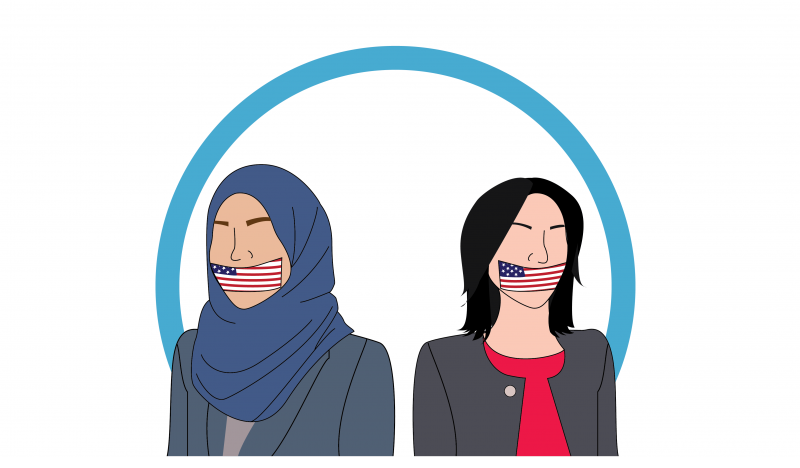The Democracy Index Study 2016 stated that Israel is the only democracy in the Middle East. And yet, as Rosa Drucker, a member of American Jewish group IfNotNow, mentioned during a press conference, Palestinians are denied proper medical care, education, economic opportunity, and freedom of movement.
There’s another name for this selective democracy; it’s called systemic discrimination. That is what resulted in Ilhan Omar and Rashida Tlaib being banned from entering Israel on a diplomatic visit.
“What we saw this week demonstrates Israel’s desperation to hide the realities of the occupation from us,” said Drucker. I mention this because it’s important to note that Anti-Semitism – despite the right’s incessant attempt to convince itsel – is not the same as being against the inhumanity shown by Israel to Palestine.
“I’ve never seen anyone who has gone and seen for themselves, and not be transformed by that experience,” said journalist Peter Beinart in an interview on CNN. Beinart also preaches at his synagogue and is a highly devoted Jew who has been to Israel, and seen Palestine.
Omar and Tlaib’s visit was organised by the Palestinian group called Miftah, whose leader is Hanan Ashrawi, a politician who once delegated Palestinian-Israeli peace talks. According to Ruth Margalit in The New Yorker, Miftah has previously shown disdain towards Israel. It’s understandable why the government felt uneasy about the visit.
Margalit also stated that Israel passed a law in 2017 that allows the government to refuse admittance to people who support the boycotting of the state. Israel’s deputy foreign minister, Tzipi Hotovely, told The New Yorker it was a moral stance, and the government had no choice but to ban the congresswomen. However, opposing leaders in the state pointed out that the interior minister has the right to make exceptions.
“A democratic country can’t deny entry to elected officials of a friendly democracy,” said Tamar Zandberg, of the leftist Meretz Party, in a statement.
The point that should be stressed here is that the law has rarely, if ever, been used against Americans. It shows that the Israeli state doesn’t really see the American in Omar and Tlaib. Sound familiar? American Palestinians, such as Tlaib’s family, have been put through agonising treatment with several check-points which other Americans don’t undergo. Tlaib recalled in her speech at the press conference, the humiliation her parents went through when she was younger. Treating someone differently because of their ethnicity, despite equal citizenship and rights, is racist.
Even though the visit was organised by Miftah, Omar and Tlaib were supposed to meet with Aida Touma-Sliman, a representative of the Joint List, a political alliance between the main Arab-dominated Parties in Israel— Balad, Hadash, Ta’al, and United Arab List. The Joint List does not support the Boycott, Divestment, and Sanctions (B.D.S) movement.
The trip was titled “Delegation to Palestine,” and it was a call to the state for transparency on their treatment of Palestinians. Israeli Prime Minister Benjamin Netanhayu stated there would be no meeting with members of the Israeli Parliament as a reason for his decision on the ban. In that case, shouldn’t all democratic visits who have previously only met with one side also be forced to meet with both? Or is this just another attempt at having control over what is seen and what isn’t?
Margalit wrote in her article in The New Yorker about meeting with Touma-Sliman; she was supposed to “draw parallels between the Israeli government’s treatment of Palestinians and its own Arab citizens and President Trump’s treatment of immigrants.”
This visit would have shone the light on infringements of international human rights. Those raging about ICE and the situation in the U.S. should be aware of the similarities in Israel’s treatment of Palestinians.
When Israel gave Tlaib permission to enter the state under humanitarian pretences, she refused because of all the restrictions— restrictions that involved going against her moral beliefs. Unable to see her grandmother, unable to see Palestine, unable to expose atrocities; that’s the agenda.
Some challenged Tlaib’s genuine regret in not being able to see her grandmother, stating that had she really wanted to see her, she would’ve abided by the restrictions set by the Israeli government. Tlaib’s response was simple. A Tweet. A quote from Desmond Tutu:
“I am not interested in picking up crumbs of compassion thrown from the table of someone who considers himself my master. I want the full menu of rights.” Israel doesn’t even have appetizers for Palestinians, and that is no mere opinion.
There is a reason all these opposing voices are dubbed terrorists or anti-semitic without a second thought. History is written by the victors, and, so far, those who haven’t seen believe self-proclaimed heroes. This is a worldwide story, where discrimination, racism, and political gain are the major themes — the only difference is that some characters look like you, while others look like me.
Graphic by Victoria Blair
